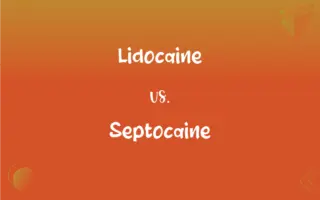Carbohydrates vs. Starch: What's the Difference?
Edited by Aimie Carlson || By Janet White || Published on January 30, 2024
Carbohydrates are a broad class of biomolecules including sugars, starches, and fiber; starch is a complex carbohydrate consisting of glucose units.

Key Differences
Carbohydrates are a major class of biomolecules that include sugars, starches, and fibers, serving as a primary energy source in diets. Starch, specifically, is a type of complex carbohydrate made up of long chains of glucose molecules.
Carbohydrates encompass a wide range of molecules from simple sugars like glucose and fructose to complex forms like cellulose and starch, while starch is specifically a storage form of energy in plants and is composed of two types of molecules: amylose and amylopectin.
Carbohydrates can be divided into simple carbohydrates (sugars) and complex carbohydrates (starches and fibers), with the latter being more beneficial for sustained energy release. Starch, as a complex carbohydrate, is digested more slowly, providing a more gradual supply of energy.
In human nutrition, carbohydrates are essential for providing energy, supporting bodily functions, and dietary fiber. Starch is a key component of many staple foods like potatoes, rice, and wheat, and is a major source of energy.
Carbohydrates are also involved in various biological processes, including cellular communication and immune response. Starch, meanwhile, plays a crucial role in plant physiology as a way to store energy for later use.
ADVERTISEMENT
Comparison Chart
Definition
A class of biomolecules including sugars, starches, and fibers
A complex carbohydrate composed of glucose units
Types
Simple (sugars) and complex (starches and fibers)
Consists mainly of amylose and amylopectin
Role in Diet
Provide energy, dietary fiber, and support bodily functions
Major energy source in staple foods
Digestion
Varies from quick (sugars) to slow (complex carbs)
Slow digestion, providing gradual energy release
Biological Function
Involved in energy supply, cellular functions
Serves as energy storage in plants
ADVERTISEMENT
Carbohydrates and Starch Definitions
Carbohydrates
Carbohydrates include sugars, starches, and dietary fibers.
Whole grains are a good source of complex carbohydrates.
Starch
It is a major form of stored carbohydrate in plants.
Corn stores energy in the form of starch.
Carbohydrates
Carbohydrates are organic compounds made up of carbon, hydrogen, and oxygen.
Fruits are rich in natural carbohydrates.
Starch
It consists of two types of molecules: amylose and amylopectin.
The structure of starch affects its digestibility.
Carbohydrates
Simple carbohydrates are quickly absorbed, providing immediate energy.
Candy contains high amounts of simple carbohydrates.
Starch
Starch is a polysaccharide made up of numerous glucose units.
Potatoes are high in starch content.
Carbohydrates
Carbohydrates play a role in cellular structure and function.
Cellulose, a carbohydrate, gives structural support to plant cell walls.
Starch
Starch is broken down into glucose during digestion.
Bread, a starchy food, is a staple in many diets.
Carbohydrates
They are a primary energy source in the human diet.
Carbohydrates should constitute a significant part of daily calorie intake.
Starch
Starch serves as a slow-releasing source of energy.
Rice, a starchy food, provides sustained energy.
Carbohydrates
Any of a group of organic compounds, including sugars, starches, celluloses, and gums, that contain only carbon, hydrogen, and oxygen and that originate chiefly as products of photosynthesis. Carbohydrates serve as a major energy source for living things.
Starch
A naturally abundant nutrient carbohydrate, (C6H10O5)n, found chiefly in the seeds, fruits, tubers, roots, and stem pith of plants, notably in corn, potatoes, wheat, and rice, and varying widely in appearance according to source but commonly prepared as a white amorphous tasteless powder.
Carbohydrates
A food, such as bread, rice, or potatoes, that is composed largely of these substances.
Carbohydrates
Plural of carbohydrate
FAQs
What are carbohydrates?
Organic compounds that are a major energy source in the diet.
What is starch?
A type of complex carbohydrate made of glucose units.
Are starches good for health?
In moderation, they provide essential energy and nutrients.
How do our bodies use carbohydrates?
They are broken down into glucose, the body's main energy source.
What role does starch play in the diet?
It provides sustained energy and is essential in many diets.
How are carbohydrates stored in the body?
As glycogen in the liver and muscles.
Is starch digestible?
Yes, though it digests slower than simple sugars.
What foods are high in carbohydrates?
Fruits, grains, and vegetables are rich in carbohydrates.
What is the difference between sugars and starches?
Sugars are simple carbohydrates; starches are complex.
Can you consume too many carbohydrates?
Excessive intake can lead to weight gain and health issues.
Are all carbohydrates the same?
No, they vary from simple sugars to complex forms like starch and fiber.
What is the glycemic index?
A measure of how quickly foods raise blood sugar levels.
What is the importance of dietary fiber?
It aids in digestion and can help prevent certain diseases.
Do carbohydrates cause weight gain?
Excess calorie intake from any source can lead to weight gain.
Are carbohydrates essential nutrients?
Yes, they're essential for energy and various bodily functions.
How does cooking affect starch?
It makes starch more digestible by breaking down its structure.
What is resistant starch?
A type of starch not easily digested, acting like dietary fiber.
Is starch only found in plants?
Yes, it's a primary energy storage form in plants.
Can starch be unhealthy?
Overconsumption, especially of refined starches, can be unhealthy.
Should diabetics avoid starch?
They should monitor intake and choose low-glycemic options.
About Author
Written by
Janet WhiteJanet White has been an esteemed writer and blogger for Difference Wiki. Holding a Master's degree in Science and Medical Journalism from the prestigious Boston University, she has consistently demonstrated her expertise and passion for her field. When she's not immersed in her work, Janet relishes her time exercising, delving into a good book, and cherishing moments with friends and family.
Edited by
Aimie CarlsonAimie Carlson, holding a master's degree in English literature, is a fervent English language enthusiast. She lends her writing talents to Difference Wiki, a prominent website that specializes in comparisons, offering readers insightful analyses that both captivate and inform.







































































